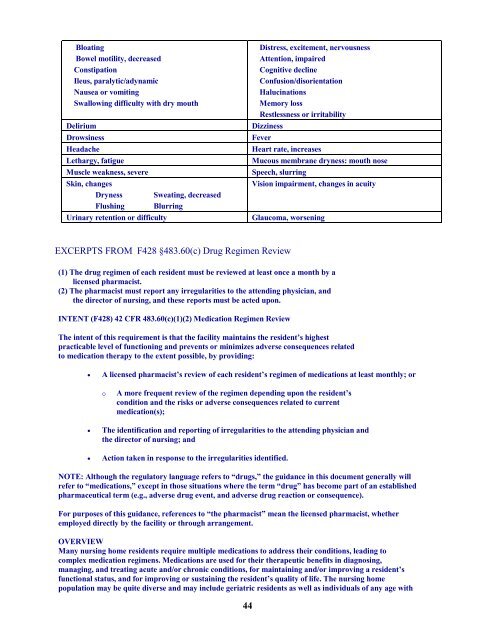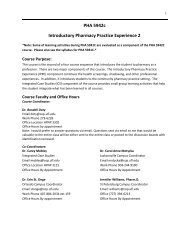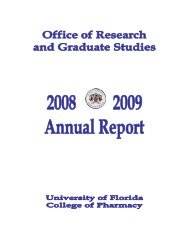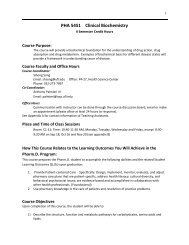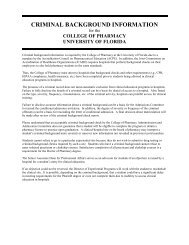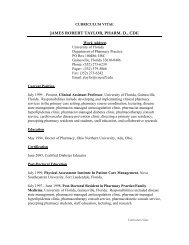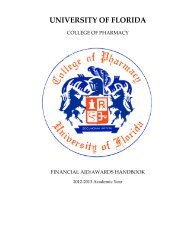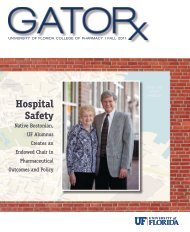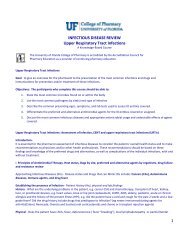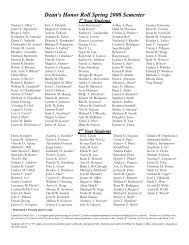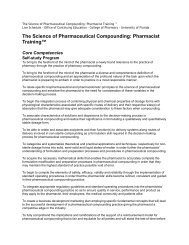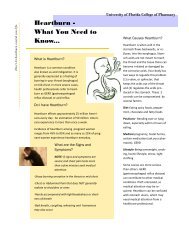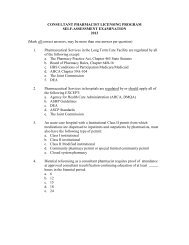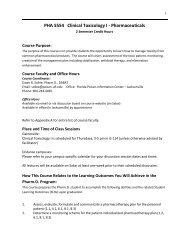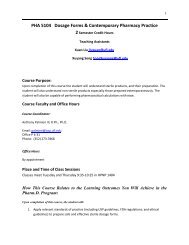Module 3: The Drug Regimen Review - College of Pharmacy ...
Module 3: The Drug Regimen Review - College of Pharmacy ...
Module 3: The Drug Regimen Review - College of Pharmacy ...
Create successful ePaper yourself
Turn your PDF publications into a flip-book with our unique Google optimized e-Paper software.
Bloating<br />
Bowel motility, decreased<br />
Constipation<br />
Ileus, paralytic/adynamic<br />
Nausea or vomiting<br />
Swallowing difficulty with dry mouth<br />
44<br />
Distress, excitement, nervousness<br />
Attention, impaired<br />
Cognitive decline<br />
Confusion/disorientation<br />
Halucinations<br />
Memory loss<br />
Restlessness or irritability<br />
Delirium Dizziness<br />
Drowsiness Fever<br />
Headache Heart rate, increases<br />
Lethargy, fatigue Mucous membrane dryness: mouth nose<br />
Muscle weakness, severe Speech, slurring<br />
Skin, changes<br />
Vision impairment, changes in acuity<br />
Dryness Sweating, decreased<br />
Flushing Blurring<br />
Urinary retention or difficulty Glaucoma, worsening<br />
EXCERPTS FROM F428 §483.60(c) <strong>Drug</strong> <strong>Regimen</strong> <strong>Review</strong><br />
(1) <strong>The</strong> drug regimen <strong>of</strong> each resident must be reviewed at least once a month by a<br />
licensed pharmacist.<br />
(2) <strong>The</strong> pharmacist must report any irregularities to the attending physician, and<br />
the director <strong>of</strong> nursing, and these reports must be acted upon.<br />
INTENT (F428) 42 CFR 483.60(c)(1)(2) Medication <strong>Regimen</strong> <strong>Review</strong><br />
<strong>The</strong> intent <strong>of</strong> this requirement is that the facility maintains the resident’s highest<br />
practicable level <strong>of</strong> functioning and prevents or minimizes adverse consequences related<br />
to medication therapy to the extent possible, by providing:<br />
• A licensed pharmacist’s review <strong>of</strong> each resident’s regimen <strong>of</strong> medications at least monthly; or<br />
o A more frequent review <strong>of</strong> the regimen depending upon the resident’s<br />
condition and the risks or adverse consequences related to current<br />
medication(s);<br />
• <strong>The</strong> identification and reporting <strong>of</strong> irregularities to the attending physician and<br />
the director <strong>of</strong> nursing; and<br />
• Action taken in response to the irregularities identified.<br />
NOTE: Although the regulatory language refers to “drugs,” the guidance in this document generally will<br />
refer to “medications,” except in those situations where the term “drug” has become part <strong>of</strong> an established<br />
pharmaceutical term (e.g., adverse drug event, and adverse drug reaction or consequence).<br />
For purposes <strong>of</strong> this guidance, references to “the pharmacist” mean the licensed pharmacist, whether<br />
employed directly by the facility or through arrangement.<br />
OVERVIEW<br />
Many nursing home residents require multiple medications to address their conditions, leading to<br />
complex medication regimens. Medications are used for their therapeutic benefits in diagnosing,<br />
managing, and treating acute and/or chronic conditions, for maintaining and/or improving a resident’s<br />
functional status, and for improving or sustaining the resident’s quality <strong>of</strong> life. <strong>The</strong> nursing home<br />
population may be quite diverse and may include geriatric residents as well as individuals <strong>of</strong> any age with


